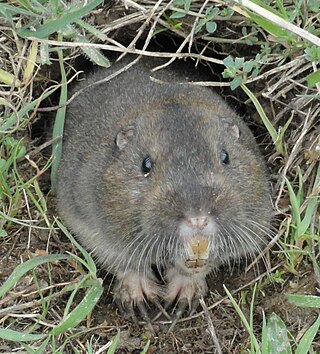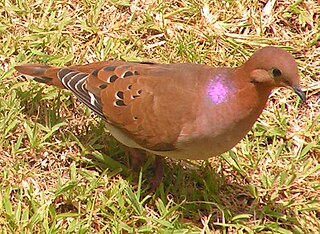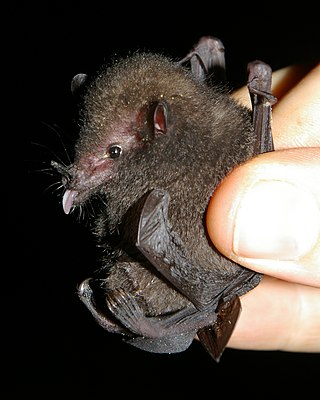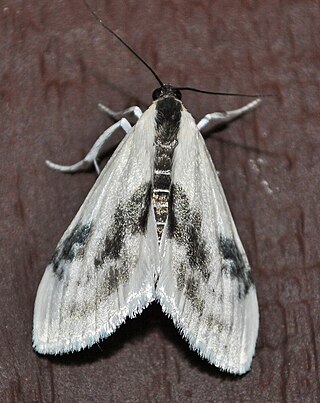
Homonota is a genus of South American geckos, commonly known as marked geckos.

The collared trogon is a near passerine bird in family Trogonidae, the quetzals and trogons. It is found in Mexico, throughout Central America, and in northern South America.

Pocket gophers, commonly referred to simply as gophers, are burrowing rodents of the family Geomyidae. The roughly 41 species are all endemic to North and Central America. They are commonly known for their extensive tunneling activities and their ability to destroy farms and gardens.

The fauna of Barbados comprises all the animal species inhabiting the island of Barbados and its surrounding waters. Barbados has more biodiversity than the other Antilles. Human activities are responsible for the change in the composition of the fauna, in particular, the replacement of native species. Species that are able to adapt to human presence have survived.
Underwood's water mouse is a species of rodent in the family Cricetidae. It is found in Costa Rican and western Panamanian cloud forest at altitudes from 1500 to 2000 m. This mouse lives near streams in highland forests and is semiaquatic; its carnivorous diet includes invertebrates. Although its range is small, it includes a number of protected areas, and the population appears to be sizable; the IUCN therefore rates the conservation status of the species as "least concern".
Craugastor underwoodi is a species of frog in the family Craugastoridae. It is found in Costa Rica and Panama. Its natural habitats are subtropical or tropical moist lowland forests, subtropical or tropical moist montane forests, pastureland, plantations, and heavily degraded former forest.
Underwood's pocket gopher is a species of rodent in the family Geomyidae. It is endemic to Costa Rica. Some authors classify it in the genus Orthogeomys, but recent research has allowed this and its related species to be classified in the genus Heterogeomys.

Underwood's bonneted bat is a species of bat in the family Molossidae.

Underwood's long-tongued bat is a species of bat in the family Phyllostomidae. It is the only species within the genus Hylonycteris. It is found in Belize, Guatemala, Mexico, Nicaragua, and Panama. Hylonycteris underwoodi feed on nectar, pollen grains, agave and fruits. This choice of food has allowed them to gain the ability of hovering flight, thereby evolving their body mass and size to compensate for the same.

Cliniodes is a genus of moths of the family Crambidae described by Achille Guenée in 1854.

Gymnophthalmus underwoodi, called commonly Underwood's spectacled tegu, is a species of microteiid lizard, which is found in South America and on certain Caribbean islands.
Centruroides underwoodi is a species of scorpion in the family Buthidae.
Halysidota underwoodi, or Underwood's tussock moth, is a moth of the family Erebidae. It was described by Walter Rothschild in 1909. It is found in Mexico, Guatemala, Nicaragua, Costa Rica, Panama, Colombia, Venezuela, Ecuador, Peru and Bolivia.
Plants of the World Online (POWO) is an online database published by the Royal Botanic Gardens, Kew. It was launched in March 2017 with the ultimate aim being "to enable users to access information on all the world's known seed-bearing plants by 2020". This was Kew's answer to the "2020 target 1" of the Convention on Biological Diversity (CBD): "an online flora for all known plants."

Eucorethra is a monotypic genus of phantom midges. The sole species is Eucorethra underwoodi Underwood, 1903.
Homonota underwoodi is a species of gecko, a lizard in the family Phyllodactylidae. The species is endemic to Argentina.

Sphaerodactylus underwoodi, also known commonly as Underwood's least gecko or the Turks Islands geckolet, is a small species of lizard in the family Sphaerodactylidae. The species is endemic to Grand Turk Island.

Cecil Frank Underwood was a British scientific collector of mammal and bird specimens in Central America.
Varroa underwoodi is a mite that feeds on honey bees. It is an external parasite of the western honey bee, Asian honey bee, A. nigrocincta, and A. nuluensisV. underwoodi has been found on multiple bee species in Southern Asia, though has only been found on the Asian honey bee in China. The smallest sized V. underwoodi was collected from Papua New Guinea from western honey bee hives.












